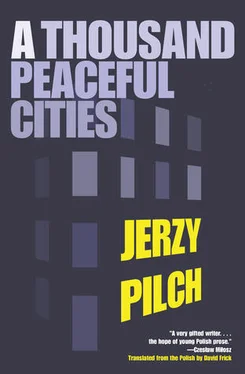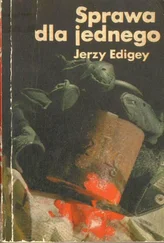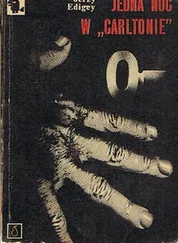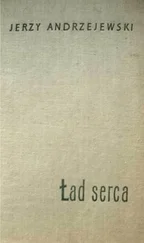“It’s raining, Comrade Trąba,” said Commandant Jeremiah with stoic calm. He took off his cap and placed his umbrella in the corner. It looked peculiar indeed in his hands — they were as big as loaves of bread.
“Atmospheric disturbances are no reason for an on-duty officer to outfit himself with such homo accessories!” said Mr. Trąba, continuing to play the strict commander rebuking the insubordination of an inferior. Moreover, Mother’s recent tenderness had truly inspired his performance. Unfortunately, and as usual, he played his role alone.
It was obvious that Commandant Jeremiah had no desire to enter into a discussion of the regulatory appropriateness of a ladies’ umbrella. He brought up a stool, sat down on it heavily, and, after a good moment, he said:
“I greet you, madame comrade and comrades.”
“Cheerio, cheerio,” replied Father and Mr. Trąba, one after the other, while Mother, in a carefully studied gesture, raised her head and eyes, turned away from the window, and glanced at the green-tiled kitchen stove.
“You are most welcome, Commandant.” (I had only recently realized that Mother, in her ascetic role, was a much greater artist than Mr. Trąba, who didn’t shy away from the occasional buffoonery.) “You are most welcome, Commandant. Will you stay for dinner? Of course you’ll stay, won’t you? I was just about to fry some potato pancakes.”
Only my masterfully penetrative and unprejudiced gaze noticed that Mother was not a woman who was concerned exclusively with cooking; rather, she was a captive who, in order to survive, pretended to be a woman who was concerned exclusively with cooking.
“Comrades,” said Commandant Jeremiah, without a hint of emotion in his voice, “comrades, allow me to get right down to business. I have heard, comrades, that you are preparing to direct a pronouncement against the First Secretary of the Central Committee.”
The Commandant stopped for a moment and gestured like a stump orator — indicating his essential approval, although with certain doubts and reservations.
“Very good, comrades, very good. Criticism is always necessary to our Party. Criticism strengthens the power of our Party, cleanses its ranks. But you must— we must — remember, comrades, that it must be constructive criticism, that is to say, criticism that is, of course, criticizing, but, generally, approving. .”
The Commandant began to get tangled up. You could see with the naked eye that he wasn’t an expert in dialectical argument, nor did he possess sufficient agitational fervor.
I was curious what polemical phrase Mr. Trąba would employ and how it would be constructed. “Complete approval,” I recorded in a flash in my notebook, for, according to my predictions, Mr. Trąba’s argument should conclude with precisely this phrase. But Mr. Trąba didn’t conclude his oration with the expression “complete approval,” nor with any other expression. He didn’t conclude his oration because he didn’t even begin it. He remained melancholy and silent the entire time.
“I understand, Commandant,” Father spoke up unexpectedly, “I understand, Commandant, that news spreads like wild fire, but, as you know, speed is not always accompanied by precision. You see, I’m not certain whether our intentions were properly understood.”
“Precisely,” said the Commandant, “precisely. Let me explain.”
He extracted a small Orbis Travel Agency datebook from the side pocket of his uniform, and he began phlegmatically turning the empty pages, which contained only printed dates, saints’ names, and names of the days of the week. He finally reached a place where there were some illegible hieroglyphs and secret ciphers, which only functionaries of the secret services could decode — although I was looking over his shoulder, I couldn’t make out a thing. Jeremiah meditated for some time over the secret code, but then he began to mutter, as if to himself, and, slowly measuring out his words, he said:
“Yes sir, this is all correct; a pronouncement directed against Comrade First Secretary, yes sir.”
He energetically closed the datebook and covered it with his large hand, as if he wished to smother the fuses that were smoldering there, as if he wished to extinguish the gathering rebellion before it could flare up.
“Comrades,” he said distinctly, “I have received a report that you comrades are planning an attempt on the life of Comrade First Secretary Władysław Gomułka.”
I no longer remember whether Mother froze in the process of scouring the stovetop, or grating potatoes, or perhaps with a match in her hand over the hearth. Today I see her frozen in a succession of these poses. Father and Mr. Trąba exchanged the all-betraying glance of inept conspirators. In the meantime, I thought it might be worth my while to check out the room in the attic again; the morphinistes had abandoned it, and I wanted to see whether they had by any chance left anything else there, besides a ribbon, a mirror, and a nail file.
“The comrades will excuse me, but since the report seemed to me — how should I put it? — only moderately plausible, I set to work in a roundabout manner. If the comrades do indeed harbor treacherous designs upon the head of state, then please, how to put it, forgive me that I subjected to doubt their, your, so to say, qualifications in this matter, but. .”
“Gomułka isn’t head of state,” Mr. Trąba, sounding bored, interrupted Jeremiah.
“Excuse me?”
“I said, Gomułka isn’t head of state. Gomułka is only the chief of the Party. The head of state is Zawadzki.”
“So is it true after all?” he said almost triumphantly. “So is it true after all? No, no, no,” he reigned himself in. “Comrades, we have known each other for a long time. We have drunk an ocean of alcohol together. We have pronounced more than one risky opinion together. I can safely — both doing myself the honor, and telling the truth — I can safely call you comrades my tried-and-true friends, and meanwhile what do I hear? Meanwhile I discover that my tried-and-true friends are making an attempt, are ready to make an attempt, at a crime against majesty. .
“Please tell me,” the Commandant’s voice became slightly, though noticeably, more concentrated and icy, “please tell me what, in the name of God the Father, am I supposed to do with this sort of information? Please,” the Commandant suddenly pleaded, “please tell me what I am supposed to do? I’ve come here to see — to see to what extent this matter belongs to the realm of fiction, and to what extent to the realm of reality.”
“I wish, I wish very much that my death might belong to the realm of fiction,” Mr. Trąba spoke up, “but those, I fear, are highly pious wishes.”
“But after all, isn’t it finally a question not of your death, but of fatal harm to Comrade Gomułka?”
“Unfortunately, Mr. Commandant,” replied Mr. Trąba, “setting all my vanity aside, I must put my own person in the foreground and assure you that, above all, it is a question of me.” And Mr. Trąba expounded upon his deathbed ambitions in a few sentences, hiding nothing.
Commandant Jeremiah listened carefully to Mr. Trąba’s implacably logical arguments.
“If I understood you correctly, comrade, you expect a quick departure from this world, but in fact, what reason do you have to expect this departure?”
“One general and seven particular reasons,” retorted Mr. Trąba, and he began to count on his fingers. “First, cirrhosis of the liver; second, a bursting pancreas; third, severe inefficiency of the kidneys; fourth, a weakening heart; fifth, stomach ulcers; sixth, delirium tremens ; seventh, and the simplest, choking on my own vomit. These are seven good reasons, not subject to falsification, each of which individually, and all of them together, are identically effective, and all of them,” Mr. Trąba raised his index finger decisively in the air, “are already prepared. The seven beasts are already in readiness, seven chimeras already lie waiting to jump. Yes,” he bellowed suddenly, “the seven pillars of my death have already been erected!”
Читать дальше












